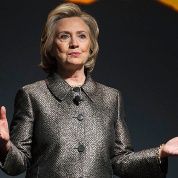Former Secretary of State Hillary Clinton is deemed by many to be a shoo-in to be next United States president.

As the U.S primary season kicks into gear, we take a look at what Clinton’s past could mean for the U.S’ neighbors in Latin America given her notorious record in the continent.
Below are some of the low points of the self-proclaimed “La Abuela” from her time as secretary of state regarding Latin America.
Democratically elected President Manuel Zelaya was ousted in 2009 by the Honduran military in alliance with opposition parties. President Zelaya had organized a referendum to ask the Honduran people if they would like to begin a process toward creating a new constitution.
The coup against Zelaya was widely condemned by governments across Latin America, the European Union, the Organization of American States and other regional blocs.
However, Clinton swiftly took the bull by the horns. She admitted in her autobiography “Hard Choices,” that she used her power to stir the crisis into a favorable outcome for the U.S., even if it meant forgetting about democracy.
“We strategized on a plan to restore order in Honduras and ensure that free and fair elections could be held quickly and legitimately, which would render the question of Zelaya moot,” she admitted in her book.
Of course, the “free and fair” elections that Clinton envisioned included a media blackout and targeted assassinations of anti-coup leaders ahead of the polls. No international institutions monitored the elections.
Cables revealed by WikiLeaks in 2011 gave the world a particular insight to the shady diplomatic workings of the U.S. government.
They also revealed Hillary Clinton's strategy for dealing with Latin America, a region steadily distancing itself from the history of U.S. domination.
“We especially value information on leaders' operating styles, demeanor, motivations, strengths and weaknesses, relationships with superiors, sensitivities,” she wrote on a cable to U.S. diplomats in Brazil.
During Clinton's term as Secretary of State, cables assessing the psychological features of Latin America became common, with diplomats reaching out to local and biased experts which would deliver second-hand interpretative analysis.
As journalist Nikolas Kozloff explained after reviewing the cables, “leaders are referred to as petulant children holding naïve ideas about the world.”
As secretary of state, Clinton vowed to improve relations with late Venezuelan President Hugo Chavez.
During a congressional hearing in 2009, she said, “We’ve isolated him, so he’s gone elsewhere. I mean, he’s a very sociable guy. He’s going to look for friends where he can find them. And so he’s finding friends in places we’d prefer him not to find friends,” Clinton told the House Foreign Affairs Committee.
Both Clinton and Chavez had friendly discussions on restoring U.S.-Venezuela relations. However, in her book “Hard Choices” Clinton spoke of the late president in a different tone.
The former secretary of state wrote that Chavez was a “self-aggrandizing dictator,” despite the record number of elections Venezuela held during his tenure, all verified as free and fair by international organizations.
As Chavez noted dryly in 2010, as the secretary of state was finishing a Latin American tour, “I'm not loved by Hillary Clinton.”
In 2012, Paraguay’s elected president was ousted in what regional leaders labelled a parliamentary coup.
Regional bodies such as UNASUR and Mercosur applied political sanctions by suspending Paraguay’s membership in the organizations. Argentina responded by saying it "will not validate the coup in Paraguay."
Despite the strong action from South America, the U.S. Department of State response was tepid, echoing the way in which inaction in Honduras aided the coup-plotters.
When asked by reporters if Washington determined whether the impeachment constituted a coup, Clinton’s spokesperson Victoria Nuland said, "We have not."
During an official visit to Brazil in 2010, Secretary of State Clinton failed in her attempt to divide the countries of South America. Clinton talked about Venezuela as a bad example, criticizing its government, despite the long-standing friendship between Brazilian President Lula Da Silva and Venezuelan President Hugo Chavez.
“We wish Venezuela were looking more to its south and looking at Brazil and looking at Chile and other models of a successful country,” she said, praising the host in an effort to draw support.
But her strategy backfired. Brazilian Foreign Minister Celso Amorin took her words and gave them a twist.
“(We agree) on one point … that Venezuela should look southwards more … that is why we have invited Venezuela to join Mercosur as a full member country,” he replied. Mercosur is the largest trading bloc in Latin America, and the United States was not keen on Venezuela joining it.